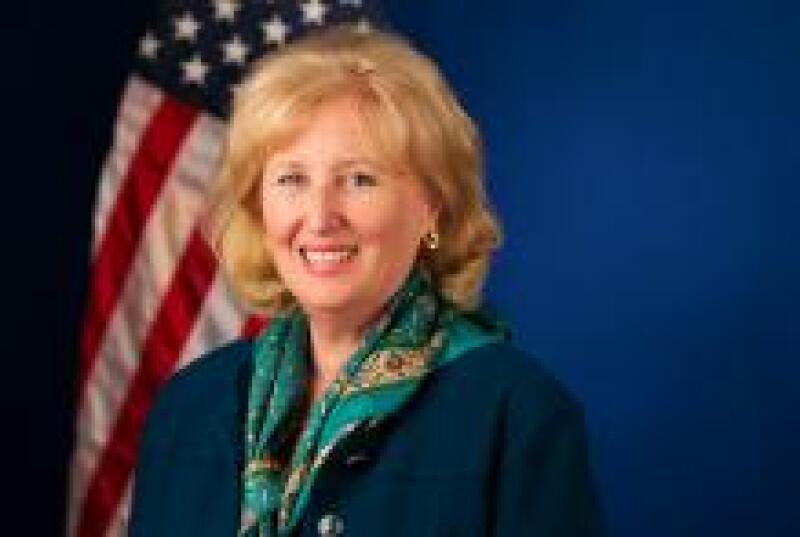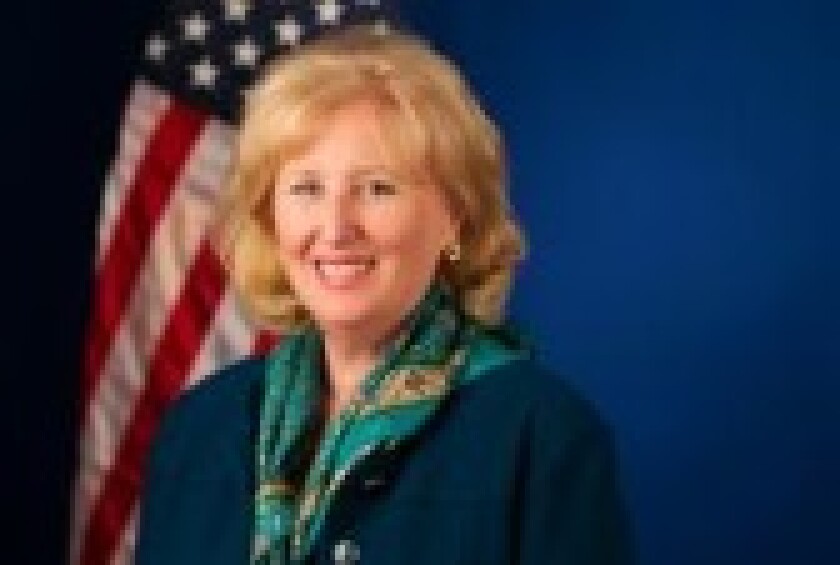
Going into intellectual property law “wasn’t something that I had ever planned,” says Mary Boney Denison. Nevertheless, she has enjoyed a successful career in trade mark law and as the USPTO’s commissioner for trade marks. Denison has held the office for almost two years, since being promoted from deputy commissioner at the start of 2015.
You can still hear Denison’s home state of North Carolina in her accent, but don’t let that fool you: she started early in Washington DC. She attended the Madeira School, an all-girls boarding school in Virginia for her last two years of high school. As part of the curriculum, all students had a job on Wednesdays, which was the school’s way of allowing the girls to explore potential career paths. One of Denison’s “jobs” was with the Senate Rules Committee. “While, there, I developed a friendship with one of the assistants, and she spent a lot of time trying to tell me that I should got to law school,” says Denison. “So that kind of got me thinking about it initially.”
By the time Denison’s graduation from Duke University was approaching, she’d developed other ideas. After a “fabulous” junior year at the French University in Paris, Denison was determined to move back before the ink was dry on her diploma. After announcing this to her parents, “they spent the next six months talking me out of that,” Denison laughs, “and I think the fact that I had no plan for supporting myself had something to do with that.”
Denison’s mother had a much more pragmatic and world-wizened life-plan in mind for her daughter, and had reason to want her daughter to have a clear way of supporting herself. Denison’s mother had watched many of her friends lose their husbands to divorce or death, “and all of a sudden they had to support themselves, and most of them were not in a position to do that.” there was one exception: a friend who had gone to law school, passed the bar and maintained her bar membership, but never practiced. “All of a sudden, she’s in her mid-forties, [her husband] leaves her and she hangs out her own shingle, and she starts practicing law, for the first time, 20 years after she graduated law school,” Denison says.
Her friend’s success and newfound independence made a lasting impression on Denison’s mother, who wanted the same for both of her two daughters. With that example of a woman who could provide for herself in mind, Denison’s mother pushed hard for her and her sister to go to law school. “I don’t think she actually really cared if we ever worked, but she looked at it as our safety net. She wasn’t giving us a trust fund, but she could give us an education and the qualifications to protect us,” says Denison.
A way into IP
After graduating from law school at the University of North Carolina, Denison did go right to work, passing the bar, moving to New York City and joining a small firm (which eventually became a part of Holland & Knight, after her departure) there as an associate in the litigation department. Many of the firm’s clients were major British and Irish brands – names like Burberry and Waterford – that needed trade mark work done in the US. So, in spite of her position as a litigation associate, Denison gained substantial experience doing trade mark work for major clients in the very early stages of her career.
When Denison made the move to the DC office of a larger firm (the now-defunct, California-based Graham & James), the firm needed an associate each in its trade marks and trade departments. “I remember this other associate and I were kind of dragged in and they said: ‘Well, what do you want to do?’” Denison says. “And it just sort of happened.”
Denison became a partner in the trade mark department and eventually went on to form her own firm with some of her fellow Graham & James colleagues. As Denison’s private practice career progressed and she continued to succeed, “I was frequently the only woman in the room,” she says, “especially at the beginning of my career, but really until I came to the PTO,” in 2011.
While in private practice, Denison became actively involved in the International Trademark Association (INTA), which nominated her to its Trademark Public Advisory Committee, a seat which she held until she stepped down to take on her first role in the USPTO as deputy commissioner for trade marks.
At the USPTO, Denison has been “delighted by how many hard-working, smart people there are here”. She says: “You just don’t know what the average person is going to be like, and I was really delighted, because they’re really terrific, and they’re just dedicated to public service, and it’s really been fabulous.”
Setting an example
According to the USPTO’s statistics, 62% of Denison’s colleagues in the Trademark Office are women, as compared to 36% in the USPTO as a whole. Women hold a number of senior executive service (SES) positions within the USPTO, including chief policy officer and director of international affairs Shira Perlmutter, general counsel Sarah Harris, USPTO director Michelle Lee, and, of course, Denison herself.
Overall, about 37% of the USPTO’s executives are women, as compared to 30% of SES positions throughout the government. “So I think we are doing a good job of setting a good example in the PTO for raising through the glass ceiling,” says Denison.
In addition to her priorities in modernising the Trademark Office – such as improving customer experience and encouraging entirely digital filings – Denison makes a priority of listening to and mentoring her employees, making sure to give them a chance to be heard, whether to express concerns or pitch ideas.
“Really one of the most important things that can be done is to mentor younger women and help them to believe in themselves,” says Denison. Although she does this for all of her employees, often women in particular, “I think, suffer from self-confidence issues, and that is really critical, having self-confidence and believing in yourself,” says Denison.










